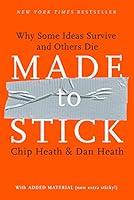So Wordsworth describes at the opening of Book XII of The Prelude how inspiration requires both the effort by which the mind ‘aspires, grasps, struggles, wishes, craves’ and the stillness of the mind which ‘fits him to receive it, when unsought’ – despite the effort, it still only comes unsought.
Compare the above with Hannah Arendt's descriptions of "thinking," such as undertaken by Socrates.
Plotinus’s level of Soul is in turn divided into two sublevels, one rapt in upward contemplation, the other dynamically involved below. The tradition of this distinction in Greek philosophy goes back from Plotinus through Middle Platonist and Neopythagorean sources to Aristotle’s distinction between active and passive intellect, and ultimately to Plato’s conception of the World Soul in the Timaeus.
As we pored over hundreds of sticky ideas, we saw, over and over, the same six principles at work. PRINCIPLE 1: SIMPLICITY How do we find the essential core of our ideas? A successful defense lawyer says, “If you argue ten points, even if each is a good point, when they get back to the jury room they won’t remember any.” To strip an idea down to its core, we must be masters of exclusion. We must relentlessly prioritize.
And for a deeper dive today:
Plato knew this. He has left us a psychological study of the political slave-driver (in Greek ‘tyrant’) and a psychological study of the slave, the ‘tyrant’s’ subject. The results are the same. The lack of free will, the inability to resist the pressure of emotional forces, which makes the slave a slave, is also what makes the ‘tyrant’ a ‘tyrant’.
To narrate the genesis and career of the ‘tyrant’ (for us to-day, as it was for Plato or the Hellenistic period, an absorbing task) is not exactly the business of political science, because the field of activity in which the ‘tyrant’ distinguishes himself is not, strictly speaking, political. For the time being, let us call it pseudo-political.
Collingwood, R. G.. The New Leviathan. Read Books Ltd.. Kindle Edition.






